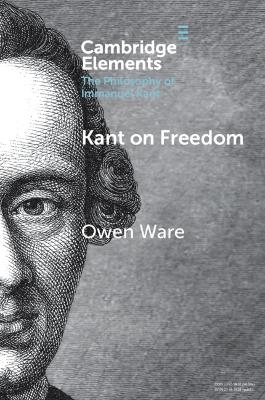
Kant on Freedom
Seiten
2023
Cambridge University Press (Verlag)
978-1-009-07455-1 (ISBN)
Cambridge University Press (Verlag)
978-1-009-07455-1 (ISBN)
This Element argues that Kant was a consistent proponent of the claim that the moral law is the causal law of a free will, and that the supposed ability of free will to choose indifferently between options is an empty concept.
Kant's early critics maintained that his theory of freedom faces a dilemma: either it reduces the will's activity to strict necessity by making it subject to the causality of the moral law, or it reduces the will's activity to blind chance by liberating it from rules of any kind. This Element offers a new interpretation of Kant's theory against the backdrop of this controversy. It argues that Kant was a consistent proponent of the claim that the moral law is the causal law of a free will, and that the supposed ability of free will to choose indifferently between options is an empty concept. Freedom, for Kant, is a power to initiate action from oneself, and the only way to exercise this power is through the law of one's own will, the moral law. Immoral action is not thereby rendered impossible, but it also does not express a genuine ability.
Kant's early critics maintained that his theory of freedom faces a dilemma: either it reduces the will's activity to strict necessity by making it subject to the causality of the moral law, or it reduces the will's activity to blind chance by liberating it from rules of any kind. This Element offers a new interpretation of Kant's theory against the backdrop of this controversy. It argues that Kant was a consistent proponent of the claim that the moral law is the causal law of a free will, and that the supposed ability of free will to choose indifferently between options is an empty concept. Freedom, for Kant, is a power to initiate action from oneself, and the only way to exercise this power is through the law of one's own will, the moral law. Immoral action is not thereby rendered impossible, but it also does not express a genuine ability.
1. Introduction: The Free Will Dilemma; 2. Kant's Moral Necessitarianism: Against Indifference; 3. The Reception of Kant's Theory of Freedom ; 4. Concluding Remarks; Abbreviations; Appendix A Moral Progress and Perfection Appendix B Timeline of the Freedom Controversy; References.
| Erscheinungsdatum | 31.05.2023 |
|---|---|
| Reihe/Serie | Elements in the Philosophy of Immanuel Kant |
| Zusatzinfo | Worked examples or Exercises |
| Verlagsort | Cambridge |
| Sprache | englisch |
| Maße | 152 x 229 mm |
| Gewicht | 108 g |
| Themenwelt | Geisteswissenschaften ► Philosophie ► Ethik |
| Geisteswissenschaften ► Philosophie ► Geschichte der Philosophie | |
| Geisteswissenschaften ► Philosophie ► Philosophie der Neuzeit | |
| Sozialwissenschaften | |
| ISBN-10 | 1-009-07455-5 / 1009074555 |
| ISBN-13 | 978-1-009-07455-1 / 9781009074551 |
| Zustand | Neuware |
| Informationen gemäß Produktsicherheitsverordnung (GPSR) | |
| Haben Sie eine Frage zum Produkt? |
Mehr entdecken
aus dem Bereich
aus dem Bereich


